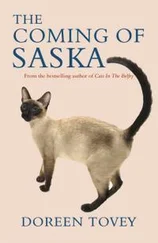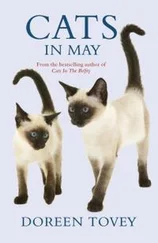He wouldn't have been for long, the way she was beating him up, but in March we had a week of heavy snow. It kept Belle away. Our two rarely went out. When they did, it was up a solid, snow-packed track from which her scent had been obliterated. Shebalu forgot about her and Sass could breathe again – which was more than could be said for the rest of us.
Miss Wellington was on the trail. The weather forecast had given snow – heavy over Western hills, which was us. This explained why our starlings had arrived the previous day, several weeks earlier than usual. They nested in our roof every year – they had entrances under the tiles above the gutter – and they moved in like a migrating tribe of Red Indians. We could hear them up there, scuffling in one corner, banging away in another, protesting as they squeezed narrowly in through the holes. Making more noise than any of the others, as he had done for several years previously, was one we could distinguish because he'd somewhere or other learned to wolf-whistle.
'If theest stopped up they holes,' Father Adams told us every spring, 'they 'ouldn't get in there tearing up thee roof.'
Actually we wouldn't have turned them out for anything. It had been their nesting place for years. But one or two of them did bang away as if they were using steam-hammers. They'd start up at dawn and I'd lie in bed listening, wondering what on earth they were up to. Extending their quarters? They certainly couldn't be catching insects at that speed, unless the beams were riddled with woodworm... I'd wake Charles to listen. He'd say if it was that rotten the starlings wouldn't make much difference and turn over and go back to sleep. I'd go on listening. Every now and then there'd be a piercing Whee-eeew, as if somebody was saying Now you've done it...
That, however, was normal breeding-season behaviour. It was different the day before the snow. The starlings came in, rustled about a bit, as if they were unpacking their bags. There were a few flutters and scuffles and squawks. We heard the familiar wolf-whistle, probably saying Gosh, fancy finding this place still standing. Then they settled down, as if they were waiting for something – and twenty-four hours later we had the snow.
It came during the night. Everybody in the Valley slept peacefully, knowing that the cars were all up at the farm. We'd all heard the forecast and Miss Wellington had phoned everybody anyway, and had stood at her gate to check the cars as they went up one by one. At seven next morning the phone rang again.
'It can't be her,' I said. It was, though. Ringing all of us in turn to tell us the village was cut off. There was a drift beyond the farm, right down to the main road – she'd already been out to have a look at it. She was terribly worried, she said. Nobody could get to work. Shouldn't we get up early and try to dig through?
In her mind's eye she obviously saw us all digging away as in the salt mines. Out to the main road by nine o'clock and those who worked in town, at their desks by ten. A combination of 'Business as Usual', 'The Mail must go Through' and 'Valiant Expedition to the Arctic'. What she was overlooking was that it was a good half-mile out to the main road and the drift was packed as high as the hedge-tops. Even with elephants we couldn't have got through that lot. There was nothing for it but to wait for the snow-plough.
There being more important roads than ours we had to wait for several days, though Miss Wellington rang the Council every morning as if we were Mafeking. Meanwhile, cut off, unable to get away, the rest of the village turned its mind to other pursuits. Men sawed wood. Women baked bread because the baker couldn't get through. Children appeared with sledges. People helped one another to clear their paths. Miss Wellington, a woollen scarf over her hat and wearing enormous boots, helped everybody busily. When Charles and I went up to try to get to the village shop for milk, she was scraping away frantically in the drive of the house on the corner. When we came back an hour later, having navigated drifts that had piled up like ice caverns and frozen wastes that looked like the Antarctic, Miss Wellington was scraping away outside the Rose and Crown, obviously trying to set an example.
'Worried about thee pint?' Fred Ferry jovially enquired, stamping his feet as he went through the door. Miss Wellington regarded him frostily. He wouldn't joke if he needed an ambulance, she said, obviously still harbouring visions of him under the graveyard wall. And how was the milkman going to get through? And the man who came for the insurance?
They didn't. For days we clambered over the drifts for the milk. Somebody always brought Miss Wellington's. The insurance man, who covered several villages on a bicycle, got so behind he didn't come for weeks.
Miss Wellington continued to worry, however – if it wasn't about our being cut off by the snow, it was whether the stream would flood when the thaw came. Occasionally, by way of a change, she would potter across to the graveyard and do a stint of worrying about that. Was Tim sure the wall was safe? She was so concerned about Mr Ferry. That poor curly kale, weighed down by all that snow – wouldn't it be better for it if Tim cleared it off? Those dear, dear daffodils, flowering so bravely under their covering – she wished somebody would go to their rescue...
He wished somebody'd rescue him , Tim remarked one day, somewhat at the end of his tether. 'Ah!' replied Miss Wellington. 'We shouldn't wait for rescue! We should go out and do things for ourselves!'
So help him, said Tim, before he knew where he was she had him round the corner digging out that drift. She never gave up, did she? He could see her waving the troops up the Heights of Abraham.
Her name was Wellington, not Wolfe, but he had something there. Miss Wellington never gave in. Fred Ferry said there were times when he thought this Bannett bloke almost deserved the graveyard, living next door to she.

Eight
Sass liked the snow once he decided it was safe, but it took several excursions for him to be sure of it. After every fall he would venture cautiously out and try the surface with a paw. It would crumble. He'd reach out a little further and put his weight on it. Being a big lad, his paw would sink through. He'd reach out as far as he could with the other. Darned if it didn't look as if he was doing the crawl, said Father Adams. What was he going to think up next?
A good many things. Sass found the snow exciting. Even when he got used to it he still went at it as if he were swimming. While Shebalu stuck to the path when we took them out, shaking her paws in protest at every step, he would dash into any drift he could find like a valiantly paddling retriever. Back indoors, invigorated, he'd look round for something to do – which was how he came to institute his marathon round the settee, which even for a Siamese was pretty peculiar.
I'd seen Shebalu doing it once or twice. Our room is wide and L-shaped. She'd hurry across from under the table, round the settee, back across the room and under the table... never running, just walking quietly but hurriedly, like the White Rabbit in Alice in Wonderland.
We decided she was doing it for exercise. Being indoors so much in winter she probably thought her legs needed stretching. Two or three circuits were enough for her, however, then she'd curl up in a chair and go to sleep. Not so Sass who, when he took up the idea, circled settee and table like a merry-go-round.
Once, while I counted, he went round twenty-six times non-stop. Charles said he was probably jogging. It wasn't as simple as that, I said. I reckoned it had become another of his compulsions.
Читать дальше


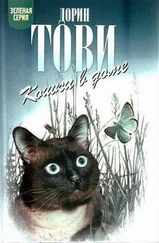
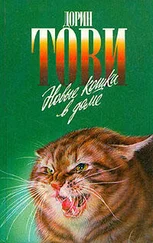
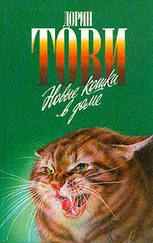





![Дорин Тови - Кошачьи хлопоты [сборник]](/books/412213/dorin-tovi-koshachi-hlopoty-sbornik-thumb.webp)
